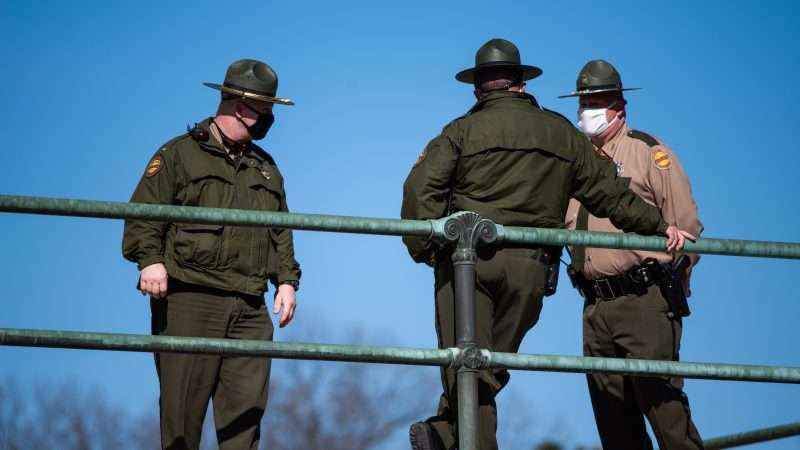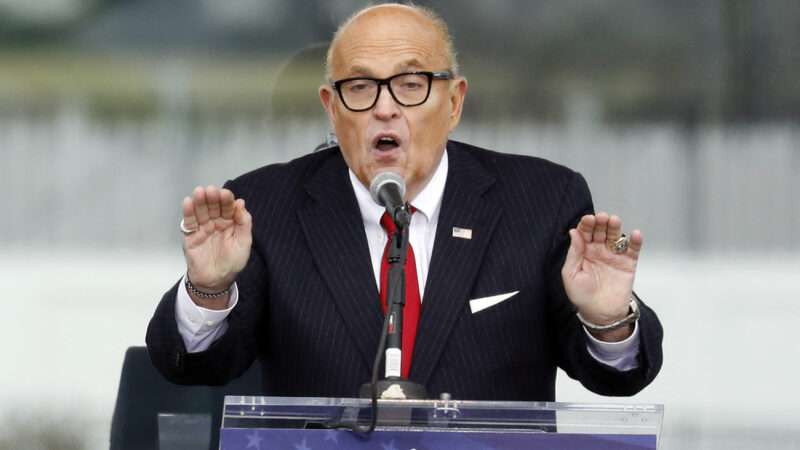Rudy Giuliani, former President Donald Trump’s personal lawyer, says the vast criminal conspiracy that supposedly denied his client a second term is “easily provable.” Yet Giuliani has never presented the evidence he claims to have. It supposedly shows that Dominion Voting Systems helped steal the election by supplying fraud-facilitating software that manufactured “hundreds of thousands” of phony votes for President Joe Biden.
Now that Dominion has filed a $1.3 billion defamation lawsuit against Giuliani, he will have to put up or shut up.
Dominion’s 107-page complaint, which it filed today in the U.S. District Court for the District of Columbia, alleges that Giuliani perpetrated “a viral disinformation campaign” based on “demonstrably false” claims about the company. According to the complaint, which is similar to the lawsuit that Dominion filed against former Trump campaign lawyer Sidney Powell on January 8, that disinformation campaign forced the company to spend “more than $565,000 on private security for the protection of its people,” plus “more than $1,170,000” to “mitigate the harm to its reputation and business.”
Dominion says the reputational damage inflicted by Giuliani’s conspiracy mongering has cost the company about $200 million in lost profits and destroyed its resale value, which it says was “between $450 million and $500 million before the viral disinformation campaign.” The company is seeking $651,735,000 in compensatory damages and the same amount in punitive damages.
During the “Save America” rally that preceded the January 6 riot at the U.S. Capitol, Giuliani told thousands of Trump supporters that he was about to blow the lid off Dominion’s alleged role in delivering Georgia to Biden. “Over the next 10 days,” he said, “we get to see the machines that are crooked, the ballots that are fraudulent. And if we’re wrong, we will be made fools of. But if we’re right, a lot of them will go to jail.” Giuliani claimed he had “conclusive proof” that “crooked Dominion machines” had switched Trump votes to Biden votes. “So let’s have trial by combat,” he said. “I’m willing to stake my reputation. The president is willing to stake his reputation on the fact that we’re going to find criminality there.”
The very next day, Trump’s attorneys dropped four lawsuits challenging Georgia’s election results, claiming they had reached “an out of court settlement agreement,” which was news to the state’s lawyers. What happened to Giuliani’s “conclusive proof”? The same thing that happened every time he and the rest of Trump’s legal team went to court, where they never alleged anything like the elaborate scheme that Giuliani and Powell repeatedly described in tweets, press conferences, interviews, and podcast monologues.
“Although he was unwilling to make false election fraud claims about Dominion and its voting machines in a court of law because he knew those allegations are false,” the company says, “he and his allies manufactured and disseminated the ‘Big Lie,’ which foreseeably went viral and deceived millions of people into believing that Dominion had stolen their votes and fixed the election. Giuliani reportedly demanded $20,000 a day for that Big Lie. But he also cashed in by hosting a podcast where he exploited election falsehoods to market gold coins, supplements, cigars, and protection from ‘cyberthieves.’ Even after the United States Capitol had been stormed by rioters who had been deceived by Giuliani and his allies, Giuliani shirked responsibility for the consequences of his words and repeated the Big Lie again.”
Trump “won that election,” Giuliani asserted on his WABC radio show last week. “You give me one hour. I will prove it to you with pictures, documents, votes and people we can call on the phone in five states.” That was a month after Dominion threatened to sue Giuliani and two weeks after his tall tale encouraged hundreds of deluded Trump followers to storm the Capitol in a vain effort to “stop the steal.”
Dominion says Giuliani hatched his disinformation scheme on the night of the election. “There’s no way he lost!” Giuliani told Trump campaign officials just after midnight, according to Axios. “This thing must have been stolen. Just say we won Michigan! Just say we won Georgia! Just say we won the election! He needs to go out and claim victory!” And that is what Trump did, beginning with the conviction that he must have won and then casting about for evidence to support it.
Two days after the election, the complaint says, Powell began encouraging the campaign to focus suspicion on Dominion. She found a receptive audience in Giuliani, who in turn encouraged Trump to echo the wild charges about massive, machine-based fraud. In November 12 interview on Lou Dobbs Tonight, Giuliani falsely claimed that Dominion is owned by Smartmatic, another company that figures in Powell’s fantasy. Giuliani said Smartmatic was created “in order to fix elections” for Venezuelan strongman Hugo Chavez and had ties to billionaire George Soros, a major supporter of Democratic campaigns and causes. Dominion’s software, Giuliani averred, “really is Venezuelan” and is essentially the same as Smartmatic’s.
Giuliani continued to tell this weird story on Twitter, on his Common Sense podcast, on his radio show, in TV interviews, and in a bizarre November 19 press conference where he stood alongside Powell, representing the “elite strike force team…working on behalf of the president and the campaign.” Meanwhile, the claims of machine-based fraud were repeatedly debunked by leading election security experts, the Cybersecurity and Infrastructure Security Agency, post-election audits and recounts, Republican election officials, Republican members of Congress, and Trump’s own attorney general. Although Giuliani never dared to float the Dominion allegations in court, Powell and another pro-Trump lawyer, Lin Wood, detailed the conspiracy theory in several suits, presenting highly dubious evidence that failed to impress a single judge.
“Plaintiffs append over three hundred pages of attachments, which are only impressive for their volume,” a federal judge in Arizona wrote in response to one of Powell’s lawsuits. “The various affidavits and expert reports are largely based on anonymous witnesses, hearsay, and irrelevant analysis of unrelated elections.” She noted that “the ‘expert reports’ reach implausible conclusions, often because they are derived from wholly unreliable sources.”
Ten days ago, the conservative website American Thinker, which Dominion threatened to sue for publishing articles that amplified Giuliani’s charges against the company, published a retraction and apology. “These pieces rely on discredited sources who have peddled debunked theories about Dominion’s supposed ties to Venezuela, fraud on Dominion’s machines that resulted in massive vote switching or weighted votes, and other claims falsely stating that there is credible evidence that Dominion acted fraudulently,” it said. “These statements are completely false and have no basis in fact. Industry experts and public officials alike have confirmed that Dominion conducted itself appropriately and that there is simply no evidence to support these claims.”
Giuliani carried on as if none of that had happened, averring that the skeptics had not seen his secret “proof.” Last Tuesday, when a caller to Giuliani’s radio show referred to the purportedly stolen election, Giuliani replied: “I investigated it. I have the evidence. What am I supposed to say? Lie? I’m supposed to lie? I got the pictures of Atlanta, where they stole 30 to 40,000 votes right in front of your eyes. And I’m supposed to lie?”
Giuliani does seem to believe that is his function. It may end up costing him a lot more than he earned by representing Trump and hawking vitamin supplements.

from Latest – Reason.com https://ift.tt/3c9hR4g
via IFTTT


